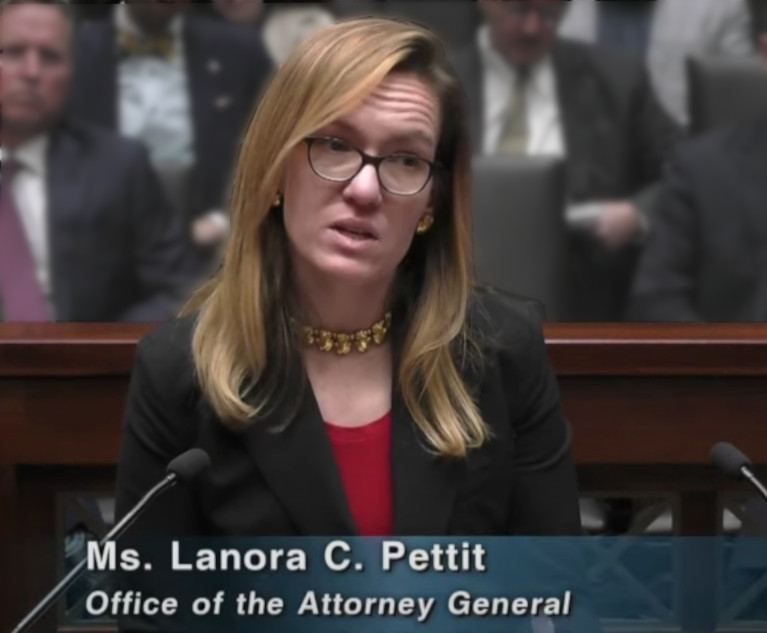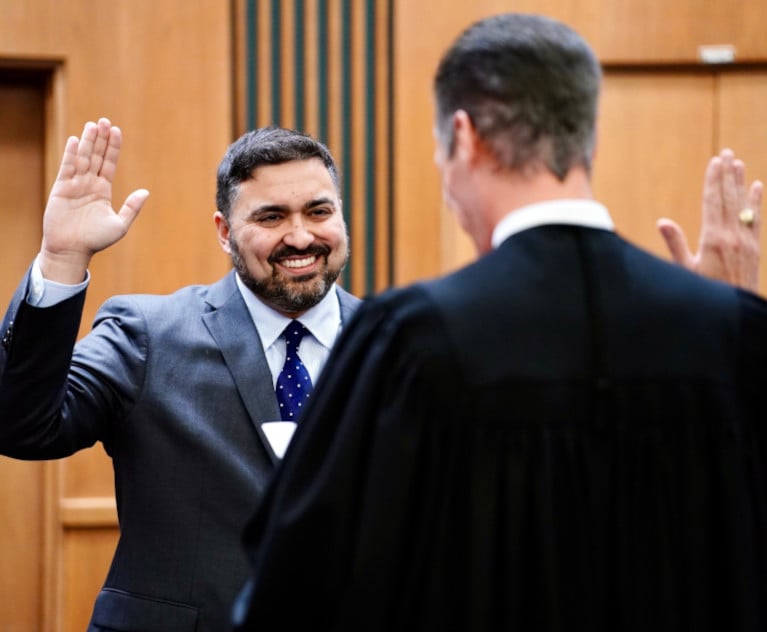Steve Fischer Likes to Talk. Now He's Under Fire for Facebook Posts, Media Comments
Steve Fischer, a commissioner on the Texas Commission on Judicial Conduct, has gone head-to-head with chairman David Hall over the commission's rules about making public statements.
April 08, 2020 at 01:24 AM
10 minute read
 Steve Fischer.
Steve Fischer.
Being true to his reputation, El Paso solo practitioner Steve Fischer has been stirring up trouble in his new position on the Texas Commission on Judicial Conduct—the group that investigates allegations of judicial misconduct.
And it's yielded a complaint against the controversial attorney.
Fischer, a former State Bar of Texas board member, has a history of successfully pushing for reform. But he's also torpedoed his own political aspirations through comments on social media.
Now, Fischer has gone head-to-head with commission chairman David Hall over rules that prevent him from making public statements about the commission.
Hall has said that only the chairman or the commission's executive director can comment for the group. But Fischer maintains he has First Amendment rights to talk about some topics—not complaints about judges or internal deliberations, but about his opinions on non-confidential business.
The battle between Hall and Fischer has been raging since Fischer first arrived on the commission in December 2019. It reached a boiling point in late March, when Hall wrote an official complaint against Fischer that listed nine pages of alleged misconduct.
The complaint drew up grounds for removing Fischer from the commission under the Texas Government Code.
In response, Fischer wrote that he wouldn't back down. His March 30 response letter claimed that Hall wants secrecy in all the commission's work, but that Fischer thinks the public has a right to know.
Fischer has been an advocate of free speech and freedom of the press since he was a young adult in the 1970s. He joined the commission with the express goal of increasing its transparency with the public.
"That's always been a big thing for me: Transparency in government is important," Fischer said, noting that he has advocated for more transparency at the State Bar of Texas in the past. "The public, and even experienced lawyers, don't know what goes on at the commission."
Hall didn't return an email seeking comment. Neither did commission executive director Jacqueline Habersham.
What's Next?
When there's a complaint about a judicial conduct commissioner, Texas law says that a letter must go to the Texas Supreme Court chief justice and the governor's office, explained Chief Justice Nathan Hecht.
 Texas Supreme Court Chief Justice Nathan Hecht. Photo: Diego M. Radzinschi/ALM
Texas Supreme Court Chief Justice Nathan Hecht. Photo: Diego M. Radzinschi/ALM"That's all it says. It doesn't say what should happen next," he said. "As far as I know, we've never gotten one."
The other justices already know about the complaint against Fischer, Hecht said. The high court may discuss it at a court conference, but Hecht said he could not say if it's already on the schedule. He also wouldn't share his own thoughts about the complaint.
"If the court took any action, it would be public," Hecht said.
State Bar of Texas president Randy Sorrels, one of the recipients of the complaint, said that he talked with both Hall and Fischer, and got the impression that the matter has already been resolved.
"I don't think the State Bar is going to do anything at this point," he said.
Facebook Follies
Fischer is well-known in Texas legal circles.
In 2013 he became only the second candidate in State Bar of Texas history to run to become the group's president-elect by gathering lawyers' signatures on a petition.
Fischer advanced to the first runoff in bar history against Trey Apffel—who's now the bar's executive director. During the runoff, Fischer enjoyed wide support from solo practitioners and small-firm attorneys, but other lawyers raised a red flag about improper comments he'd posted on Facebook.
Critics called the comments racist toward Mexicans, and said the postings attacked Catholics and criticized people who believe in organized religion.
Sorrels was one of the attorneys who'd opposed Fischer's candidacy.
When the allegations were raised during the 2013 runoff, Fischer responded that his comments were meant to be sarcastic, and that his critics had taken them out of context.
Apffel won the runoff, but Fischer gained a massive following of reform-minded attorneys.
Fischer took his experience and successfully pushed the bar to reform its election rules. He's credited with opening up the president-elect position to future petition candidates, including immediate past president Joe Longley. He's also created groups for Texas attorneys on Facebook that he says have over 25,000 members.
Disclosure
Texas Lawyer requested a copy of the Fischer complaint from the Texas Bar under a Texas Public Information Act request. That request is still pending, but in the meantime, Fischer on his own initiative emailed the complaint, and his response, to a Texas Lawyer reporter.
Read the complaint:
Hall wrote the March 23 complaint to Gov. Greg Abbott, the Supreme Court chief justice, the bar president and Texas Attorney General Ken Paxton. No one from Abbott's or Paxton's press offices responded to emails seeking comment.
Hall alleged in the complaint that Fischer has shown willful, persistent conduct to discredit the commission. He alleged Fischer disclosed confidential commission complaints, proceedings and deliberations, and has discussed legal strategies and privileged communications.
Hall also claimed Fischer was intemperate or abusive toward commissioners, staff, respondent judges and respondent counsel.
In Fischer's response, he denied intemperate interactions with commission staff and members.
But the complaint alleged Hall has received multiple complaints about Fischer.
'Go Write Some Rules'
Although the dispute between Steve Fischer and David Hall of the Texas Commission for Judicial Conduct brought a complaint for Fischer, he has also taken a step toward his goal of increasing transparency on the commission.
In February, Fischer made a presentation to the commission about confidentiality versus transparency. In the end, the commission formed a subcommittee to rewrite the commission's media rules, and it appointed Fischer to serve on the subcommittee.
This content has been archived. It is available through our partners, LexisNexis® and Bloomberg Law.
To view this content, please continue to their sites.
Not a Lexis Subscriber?
Subscribe Now
Not a Bloomberg Law Subscriber?
Subscribe Now
NOT FOR REPRINT
© 2025 ALM Global, LLC, All Rights Reserved. Request academic re-use from www.copyright.com. All other uses, submit a request to [email protected]. For more information visit Asset & Logo Licensing.
You Might Like
View All


Trending Stories
- 1Uber Files RICO Suit Against Plaintiff-Side Firms Alleging Fraudulent Injury Claims
- 2The Law Firm Disrupted: Scrutinizing the Elephant More Than the Mouse
- 3Inherent Diminished Value Damages Unavailable to 3rd-Party Claimants, Court Says
- 4Pa. Defense Firm Sued by Client Over Ex-Eagles Player's $43.5M Med Mal Win
- 5Losses Mount at Morris Manning, but Departing Ex-Chair Stays Bullish About His Old Firm's Future
Who Got The Work
J. Brugh Lower of Gibbons has entered an appearance for industrial equipment supplier Devco Corporation in a pending trademark infringement lawsuit. The suit, accusing the defendant of selling knock-off Graco products, was filed Dec. 18 in New Jersey District Court by Rivkin Radler on behalf of Graco Inc. and Graco Minnesota. The case, assigned to U.S. District Judge Zahid N. Quraishi, is 3:24-cv-11294, Graco Inc. et al v. Devco Corporation.
Who Got The Work
Rebecca Maller-Stein and Kent A. Yalowitz of Arnold & Porter Kaye Scholer have entered their appearances for Hanaco Venture Capital and its executives, Lior Prosor and David Frankel, in a pending securities lawsuit. The action, filed on Dec. 24 in New York Southern District Court by Zell, Aron & Co. on behalf of Goldeneye Advisors, accuses the defendants of negligently and fraudulently managing the plaintiff's $1 million investment. The case, assigned to U.S. District Judge Vernon S. Broderick, is 1:24-cv-09918, Goldeneye Advisors, LLC v. Hanaco Venture Capital, Ltd. et al.
Who Got The Work
Attorneys from A&O Shearman has stepped in as defense counsel for Toronto-Dominion Bank and other defendants in a pending securities class action. The suit, filed Dec. 11 in New York Southern District Court by Bleichmar Fonti & Auld, accuses the defendants of concealing the bank's 'pervasive' deficiencies in regards to its compliance with the Bank Secrecy Act and the quality of its anti-money laundering controls. The case, assigned to U.S. District Judge Arun Subramanian, is 1:24-cv-09445, Gonzalez v. The Toronto-Dominion Bank et al.
Who Got The Work
Crown Castle International, a Pennsylvania company providing shared communications infrastructure, has turned to Luke D. Wolf of Gordon Rees Scully Mansukhani to fend off a pending breach-of-contract lawsuit. The court action, filed Nov. 25 in Michigan Eastern District Court by Hooper Hathaway PC on behalf of The Town Residences LLC, accuses Crown Castle of failing to transfer approximately $30,000 in utility payments from T-Mobile in breach of a roof-top lease and assignment agreement. The case, assigned to U.S. District Judge Susan K. Declercq, is 2:24-cv-13131, The Town Residences LLC v. T-Mobile US, Inc. et al.
Who Got The Work
Wilfred P. Coronato and Daniel M. Schwartz of McCarter & English have stepped in as defense counsel to Electrolux Home Products Inc. in a pending product liability lawsuit. The court action, filed Nov. 26 in New York Eastern District Court by Poulos Lopiccolo PC and Nagel Rice LLP on behalf of David Stern, alleges that the defendant's refrigerators’ drawers and shelving repeatedly break and fall apart within months after purchase. The case, assigned to U.S. District Judge Joan M. Azrack, is 2:24-cv-08204, Stern v. Electrolux Home Products, Inc.
Featured Firms
Law Offices of Gary Martin Hays & Associates, P.C.
(470) 294-1674
Law Offices of Mark E. Salomone
(857) 444-6468
Smith & Hassler
(713) 739-1250







